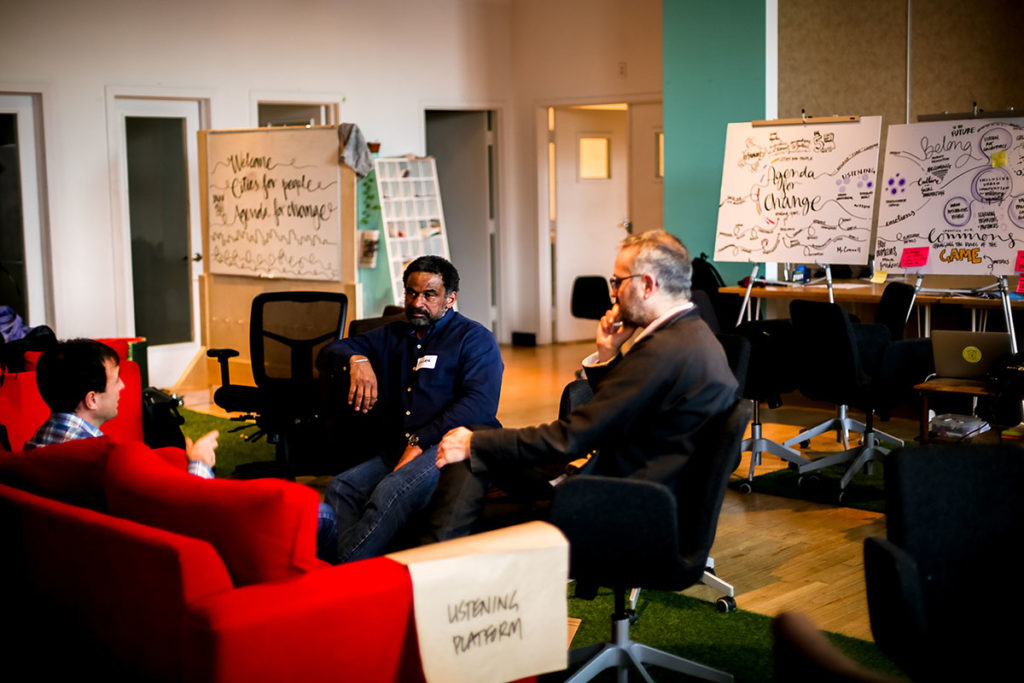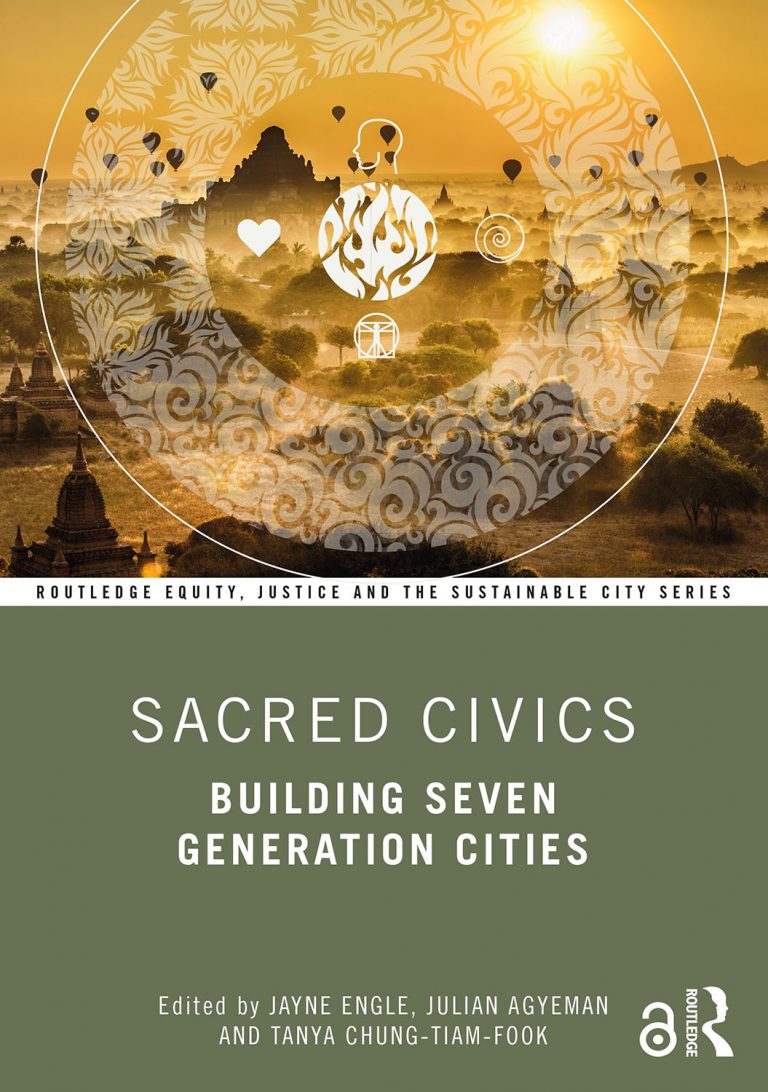Research

Julian’s research uses the concept of just sustainabilities as a platform to investigate the tension between who can belong in our cities, and what our cities can become.
He has 5 key areas of research through which he explores this tension:
1 The nexus between the concepts of environmental justice and sustainability and, specifically, the possibility of just sustainabilities;
How can environmental justice and sustainability, two potentially transformative concepts that have evolved over the past three decades to provide fresh, exciting and challenging directions for public policy and planning, be more closely allied? How can we close the ‘equity deficit’ inherent in much sustainability thinking and action? This continues to be the core of Julian’s research interest and has yielded three of his major books and many of his peer reviewed publications. The first of the books, Just Sustainabilities: Development in an Unequal World (MIT Press 2003) established the concept of just sustainabilities, the second, Sustainable Communities and the Challenge of Environmental Justice (NYU Press 2005) developed the concept further and the third, Introducing Just Sustainabilities: Policy, Planning and Practice (Zed Books 2013), refined and consolidated it, ten years after its origination. Indeed this book informs all five of his research areas and is the best single overview of his work. His 2016 Review Article Trends and Directions in Environmental Justice: From Inequity to Everyday Life, Community, and Just Sustainabilities further develops these ideas.
2 The potential of the concept of ‘spatial justice’ to contribute to just sustainabilities;
How do we, or should we, allocate rights to public space? In this area, one of Julian’s key interests has been the ‘democratization of streets’ or ‘street level spatial justice’ which he flagged in earlier blog postings and in Introducing Just Sustainabilities: Policy, Planning and Practice (Zed Books 2013). This is more fully developed in his book Incomplete Streets: Processes, Practices and Possibilities (Routledge 2014) where which notes: “streets should not be thought of as merely physical spaces, but as symbolic and social spaces. When important social and symbolic narratives are missing from the discourse and practice of Complete Streets, what actually results are incomplete streets.”
More recently he has focused on transportation Poor and black ‘invisible cyclists’ need to be part of post-pandemic transport planning too (The Conversation May 27, 2020) and especially active transportation “You want protected bike lanes, I want protected Black children. Let’s link”: A Review of Equity, Justice, and the Barriers to Active Transportation in North America." (2021).
3 The potential in emerging discourses around ‘food justice/sovereignty’ to contribute to discourses around just sustainabilities;
How do just sustainabilities play out in food systems? His book Cultivating Food Justice: Race, Class, and Sustainability (MIT Press 2011) provides an insight into the “relationships among food, environmentalism, justice, race, and identity [that] will help guide efforts to achieve a just and sustainable agriculture.” In Introducing Just Sustainabilities: Policy, Planning and Practice (Zed Books 2013) he devotes a chapter to exploring the fetishization of ‘the local‘ by arguing that “absent in much of the popular discourse surrounding local food systems, however, has been an explicit recognition of just sustainabilities concerns relating to the ability of people of color, immigrants, and low-income populations to produce, access, and consume healthy and culturally appropriate foods.”
In 2014, he published a paper: Moving the Field of Food Justice Forward Through the Lens of Urban Political Ecology which argues: “Food justice, through an urban political ecology lens, can shed light on the symptoms of unjust access to food within the food system, while simultaneously bringing attention to the insidious causes of these problems, which are rooted in the commodification of food and deregulation of the marketplace.”
Another project asks “how do we build a more inclusive local food system from the ground up?” It uses placemaking and storytelling as a tool to challenge the dominant narratives of race, class, and sexualities in the food movement by bringing a multitude of voices to the table. Visit the developing project website at Urban Food Stories.
In February 2017, The Boston Globe published Trump spills the beans on who grows Americans’ food in which he argued that “Trump’s policy goals may soon force Americans to confront the fact that we rely heavily on undocumented immigrants for more than half of our food labor supply. While these two topics are rarely linked in policy discussions, up to to 2 million of the people who pick our fruit and plant our crops are undocumented. They account for 50 to 70 percent of total US farm workers. Today’s food prices are artificially low because we use underpaid, overworked, unprotected labor.” This work is the core of his book The Immigrant-Food Nexus: Borders, Labor, and Identity in North America (MIT Press 2020).
4 The concepts of racism, settler-colonialism, interculturalism, cultural humility/competency, culturally inclusive practice and culturally inclusive spaces in urban planning;
How should urban planning and urban planners respond to increasing difference in our cities? In a blog posting Cities of (in)Difference Julian outlines some of the key issues which are taken up in greater detail in Introducing Just Sustainabilities: Policy, Planning and Practice (Zed Books 2013) where he ponders: “the implications of culture, difference, and interculturalism, and how….the concept of just sustainabilities can help us recognize, understand, and engage difference, diversity, and cultural heterogeneity in inclusive, creative, and productive ways.” In this vein, in Culture, Recognition and the Negotiation of Difference: Some thoughts on Cultural Competency in Planning Education he offers concrete suggestions as to how planning education should change to provide more culturally competent planners who see diversity as an advantage, not as a problem to be researched and ultimately managed. As our cities are increasingly different in human terms, they are also exhibiting greater ecological diversity.
In Entering cosmopolis: Crossingover, hybridity, conciliation and the Intercultural City Ecosystem he argues that “urban cultures are increasingly hybrid, cross-fertilized, and cosmopolitan. This means greater difference, not only in human but also in ecological terms. Viewed in this way, the urban area becomes a socionatural system comprising a wide range of life forms, cultures, and possibilities: it becomes an intercultural city ecosystem.” His book Food Trucks, Cultural Identity, and Social Justice: From Loncheras to Lobsta Love (MIT Press 2017) asks what do we know and what can we learn about food truck roles in cultural identity formation amongst owners and users? How does this identity connect to the broader goal of social justice? What is, and could be the role of municipal policy/planning in their presence in cities?
More recently, he has become interested in issues of (non) land recognition in US urban planning, and specifically why settler-colonial theory has not been applied to the study of U.S. cities and urban planning. Using the concept of placemaking, he uses the theory and practice of co-production as one possible intervention into how the relationships between Indigenous and non-Indigenous placemakers could be conceived and enacted in the urban environment in his 2020 article: On belonging and becoming in the settler-colonial city: Co-produced futurities, placemaking, and urban planning in the United States.
Research in this stream since 2020 has focused directly on race and urban planning through Urban planning as a tool of white supremacy – the other lesson from Minneapolis (The Conversation. July 27, 2020), Removing urban highways can improve neighborhoods blighted by decades of racist policies (The Conversation. September 7, 2021) and How urban planning and housing policy helped create ‘food apartheid’ in US cities (The Conversation. March 9, 2021),
5 The potential in sharing in cities to decrease inequality, increase social capital and to cut resource use.
How can the world’s cities, where the majority of people now live, become more socially just, more environmentally sustainable and more innovative through the 21st century reinvention and revival of one of our most basic traits: sharing? The most recent of Julian’s research foci, this interest began when he was commissioned by Friends of the Earth in the UK to come up with an integrative urban theme for their ‘Big Ideas‘ project. The subsequent report, Sharing Cities, developed his interest further than could be encapsulated in a short publication so he approached MIT Press who enthusiastically accepted an expanded manuscript which was published as Sharing Cities: A Case for Truly Smart and Sustainable Cities in November 2015.
An offshoot publication which garnered great international interest was Smart Cities Should Mean Sharing Cities in TIME Magazine in September 2014. In August 2016 The Boston Globe published Apps don’t make a city smart where he argued that: “To be truly smart, cities of the future should focus on developing democratic, participatory visions that harness smart technology to a shared agenda. Let’s create a genuinely shared urban commons and an inclusive public realm — not a place where quick adoption of smart technologies just reinforces the dominant-yet-dumb approaches of competition, enclosure, and division.” In October 2017, he focused on our fetishization of technological innovations, arguing that Innovation should serve livelihoods not lifestyles. He noted that: “All of these technologies, which together have attracted billions of investment dollars, improve wealthy and individual lifestyles rather than improving the collective livelihoods of those on lower incomes” (Boston Globe October 2017). This innovation focus has continued during his 2017-18 sabbatical in Canada, with his work for The McConnell Foundation. His article Future Cities: Creating collaborative infrastructure for inclusive urban innovation argues that "social innovations look at how people, whether meeting environmental needs like a reduced environmental footprint, or social needs like tackling poverty, inequality and social isolation or low educational attainment rates, collaborate to co-produce change."
More recently, he has been investigating race, sharing and The Black Commons in Land loss has plagued black America since emancipation – is it time to look again at ‘black commons’ and collective ownership? (The Conversation June 18, 2020).
